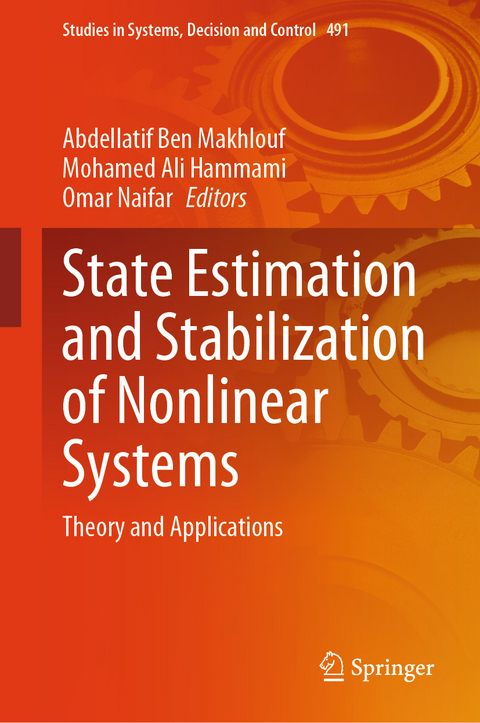
State Estimation and Stabilization of Nonlinear Systems
Springer International Publishing (Verlag)
978-3-031-37969-7 (ISBN)
This book presents the separation principle which is also known as the principle of separation of estimation and control and states that, under certain assumptions, the problem of designing an optimal feedback controller for a stochastic system can be solved by designing an optimal observer for the system's state, which feeds into an optimal deterministic controller for the system. Thus, the problem may be divided into two halves, which simplifies its design. In the context of deterministic linear systems, the first instance of this principle is that if a stable observer and stable state feedback are built for a linear time-invariant system (LTI system hereafter), then the combined observer and feedback are stable. The separation principle does not true for nonlinear systems in general. Another instance of the separation principle occurs in the context of linear stochastic systems, namely that an optimum state feedback controller intended to minimize a quadratic cost is optimal forthe stochastic control problem with output measurements. The ideal solution consists of a Kalman filter and a linear-quadratic regulator when both process and observation noise are Gaussian. The term for this is linear-quadratic-Gaussian control. More generally, given acceptable conditions and when the noise is a martingale (with potential leaps), a separation principle, also known as the separation principle in stochastic control, applies when the noise is a martingale (with possible jumps).
1.Practical h-Stability of Nonlinear Impulsive Systems: A Survey.- 2.Practical exponential stabilization for semi-linear systems in Hilbert spaces.- 3.An observer controller for delay impulsive switched systems.- 4.Stabilization of TS fuzzy systems via a practical observer.- 5.Observer-Based Robust Tracking Controller Design of Nonlinear Dynamic Systems Represented by Bilinear T-S Fuzzy Systems.- 6.H_infinity filter design for discrete-time switched interconnected systems with time delays.- 7.Stability and Observability Analysis of Uncertain Neutral Time-Delay Systems.- 8.Zonotopic State Estimation for Uncertain Discrete-Time Switched Linear Systems.- 9.Stability and stabilisation of nonlinear incommensurate fractional order difference systems.- 10.Nonlinear Fractional Discrete Neural Networks: Stability, Stabilization and Synchronization.- 11.LMI-based Designs for Feedback Stabilization of Linear/ Nonlinear Discrete-Time Systems in Reciprocal State Space: Synthesis and Experimental Validation.- 12.Overview on active fault-tolerant control.- 13.The nonlinear Progressive Accommodation: Design and methodology.- 14.Linear Methods For Stabilization and Synchronization h-Fractional Chaotic Maps.- 15.Artificial Neural Network design for non linear Takagi-Sugeno systems: Application to Tracking of trajectory, state and fault estimation of MIABOT robot.- 16.Sliding mode fault tolerant control against actuator failures for UAVs. .- 17.Frequency Stabilization in Microgrid using Super Twisting Sliding Mode.- 18.Determination of the dynamic parameters of the planar robot with 2 degrees of freedom by the method of least squares and instrumental variables.- 19.Design and Analysis of Nonsingular Terminal Super Twisting Sliding Mode Controller for Lower Limb Rehabilitation Exoskeleton Contacting with ground.- 20.Generalized Predictive Control Design of Benchmark Distillation Columns: A Case Study for Multi-Input Multi-Output System.- 21.Robust EV's speed Tracking using fractional order controller.- 22.Fractional order control of a grid connected WindPACT turbine.- 23.Comparative study between PI Controller and Fractional Order PI for speed control applied to the traction system of an Electric Vehicle (EV).
| Erscheinungsdatum | 08.11.2023 |
|---|---|
| Reihe/Serie | Studies in Systems, Decision and Control |
| Zusatzinfo | VII, 445 p. 158 illus., 126 illus. in color. |
| Verlagsort | Cham |
| Sprache | englisch |
| Maße | 155 x 235 mm |
| Gewicht | 883 g |
| Themenwelt | Informatik ► Theorie / Studium ► Künstliche Intelligenz / Robotik |
| Mathematik / Informatik ► Mathematik ► Angewandte Mathematik | |
| Technik ► Elektrotechnik / Energietechnik | |
| Schlagworte | Control Theory • Fault Estimation • Non-linear Systems • observer design • stochastic control |
| ISBN-10 | 3-031-37969-1 / 3031379691 |
| ISBN-13 | 978-3-031-37969-7 / 9783031379697 |
| Zustand | Neuware |
| Informationen gemäß Produktsicherheitsverordnung (GPSR) | |
| Haben Sie eine Frage zum Produkt? |
aus dem Bereich


